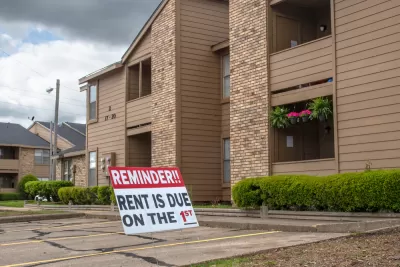The Biden administration is promising a "whole-of-government" approach to prevent an impending wave of displacement and effectively distribute rental assistance.

"The Biden administration announced today that it will extend the federal eviction moratorium issued by the Centers for Disease Control and Prevention (CDC) through July 31, and it will implement a whole-of-government approach to prevent a historic wave of evictions this summer," according to a press release from the National Low Income Housing Coalition (NLIHC). "Extending the eviction moratorium through July gives state and local governments more time to distribute more than $46 billion in emergency rental assistance (ERA) to those most in need." The CDC says the extension is intended to be the last in a series of moratoriums meant to prevent evictions during the COVID-19 pandemic.
Additional actions include:
- Convene a summit to bring together local teams to develop eviction-prevention action plans.
- Issue new guidance from Treasury for the ERA program to accelerate and broaden state and local delivery of funds.
- Have the Department of Justice send guidance to state courts encouraging them to adopt anti-eviction diversion practices.
- Provide guidance from HUD to help prevent Fair Housing Act violations related to evictions.
- Activate a whole-of-government effort to raise awareness about emergency rental assistance, tapping agencies including Treasury, HUD, CFPB, DOJ, and USDA to inform tenants and landlords of available support.
According to NLIHC, "At least 6 million renter households are still behind on rent: state and local governments must use the next month to quickly and aggressively strengthen their emergency rental assistance programs to avert an historic wave of evictions this summer and fall."

Planetizen Federal Action Tracker
A weekly monitor of how Trump’s orders and actions are impacting planners and planning in America.

Maui's Vacation Rental Debate Turns Ugly
Verbal attacks, misinformation campaigns and fistfights plague a high-stakes debate to convert thousands of vacation rentals into long-term housing.

San Francisco Suspends Traffic Calming Amidst Record Deaths
Citing “a challenging fiscal landscape,” the city will cease the program on the heels of 42 traffic deaths, including 24 pedestrians.

Trump Prompts Restructuring of Transportation Research Board in “Unprecedented Overreach”
The TRB has eliminated more than half of its committees including those focused on climate, equity, and cities.

Amtrak Rolls Out New Orleans to Alabama “Mardi Gras” Train
The new service will operate morning and evening departures between Mobile and New Orleans.

The Subversive Car-Free Guide to Trump's Great American Road Trip
Car-free ways to access Chicagoland’s best tourist attractions.
Urban Design for Planners 1: Software Tools
This six-course series explores essential urban design concepts using open source software and equips planners with the tools they need to participate fully in the urban design process.
Planning for Universal Design
Learn the tools for implementing Universal Design in planning regulations.
Heyer Gruel & Associates PA
JM Goldson LLC
Custer County Colorado
City of Camden Redevelopment Agency
City of Astoria
Transportation Research & Education Center (TREC) at Portland State University
Jefferson Parish Government
Camden Redevelopment Agency
City of Claremont





























